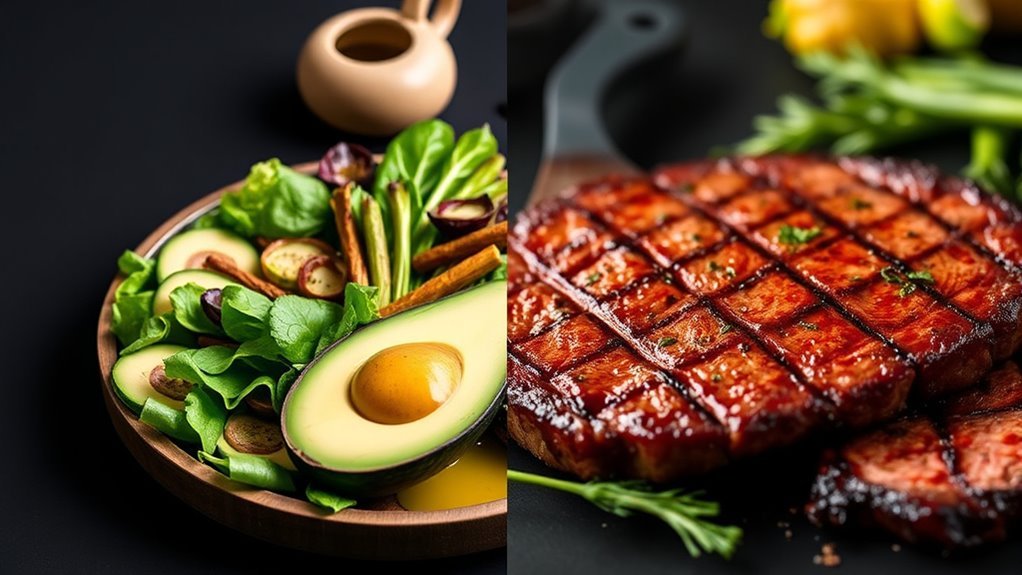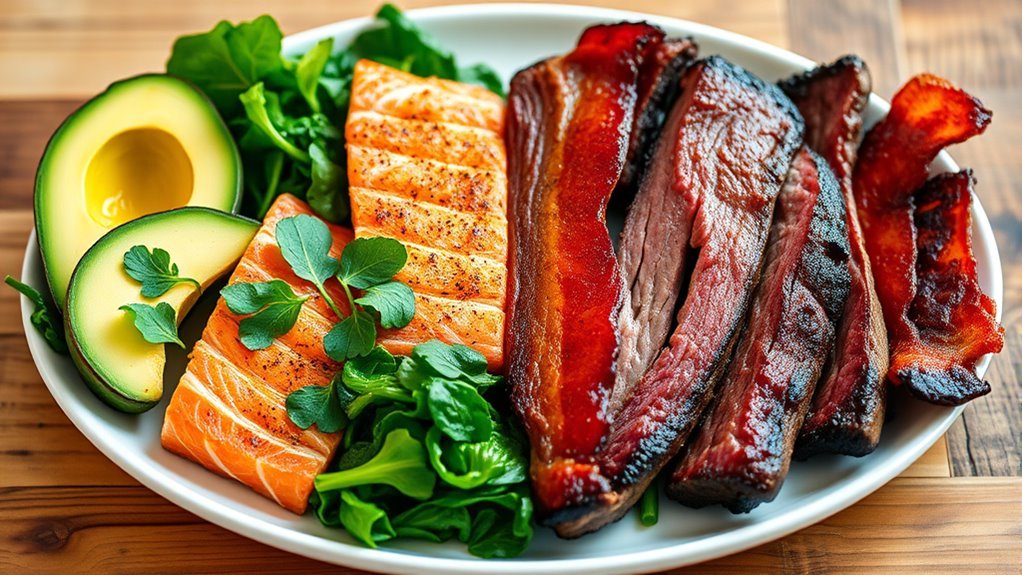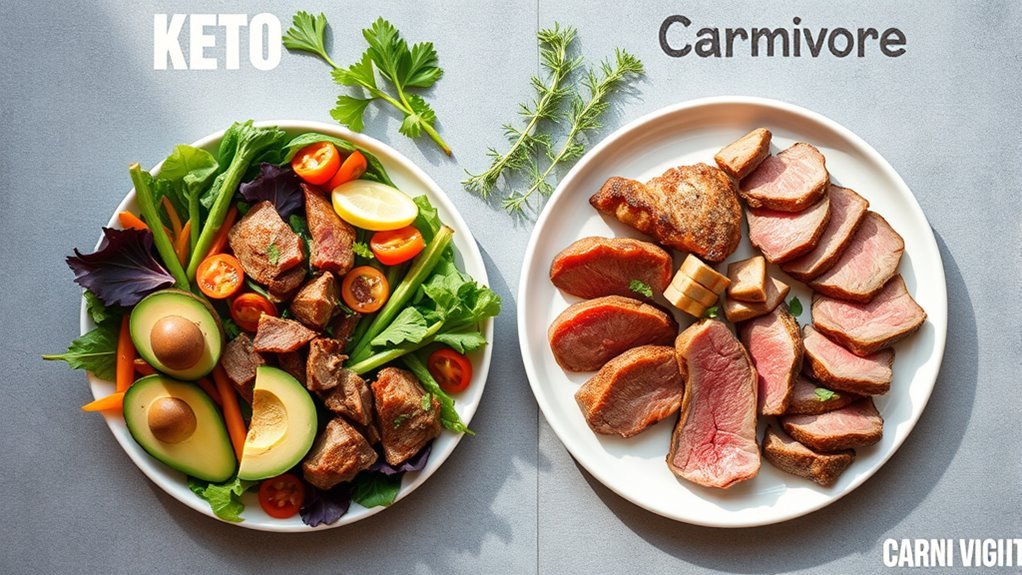When deciding between the Keto and Carnivore diets for weight loss, it really depends on your preferences and lifestyle. Keto allows a variety of low-carb foods, promoting ketosis and fat burning, while Carnivore focuses exclusively on animal products, emphasizing protein intake. Both have pros and cons, like potential nutrient deficiencies and adherence challenges. Choosing the right diet for you involves careful consideration of your goals and health. You can discover more insights to help guide your decision.
Understanding the Keto Diet

The ketogenic diet, often referred to simply as keto, is a low-carbohydrate, high-fat dietary approach designed to shift your body into a state of ketosis. By adhering to keto principles, you greatly reduce carbohydrate intake, typically to around 20-50 grams per day, which encourages your body to burn fat for fuel instead of glucose. This carbohydrate restriction can lead to weight loss, as your body becomes more efficient at using stored fat. Additionally, many people experience increased energy levels and reduced hunger. However, it’s crucial to incorporate healthy fats and maintain a balanced intake of nutrients to guarantee long-term success. Counting carbohydrates effectively is vital for maintaining ketosis and achieving optimal results. Understanding these fundamentals empowers you to make informed choices and embrace the freedom that comes with a well-planned keto lifestyle.
Exploring the Carnivore Diet

While many diets focus on a variety of food groups, the carnivore diet takes a radically different approach by emphasizing the consumption of animal products exclusively. This diet can offer a unique benefits overview, but it’s important to take into account potential risks as well.
- High protein intake can lead to increased satiety.
- Elimination of carbs may stabilize blood sugar levels.
- Simplified meal planning with fewer food choices.
- Potential improvement in certain health markers.
- However, regular blood sugar monitoring is crucial to understanding how your body reacts to this diet.
However, the carnivore diet might not be suitable for everyone. Some may experience nutrient deficiencies or digestive issues. It’s essential to weigh the benefits against these risks and consult with a healthcare professional before making significant dietary changes. Embracing freedom in your choices includes being informed about what you’re consuming.
Key Differences Between Keto and Carnivore

When comparing the keto and carnivore diets, you’ll notice key differences in macronutrient composition and food variety. Keto emphasizes a balance of fats, proteins, and a limited amount of carbohydrates, while carnivore focuses solely on animal products. This distinction leads to varying restrictions and options for meals, which can greatly impact your weight loss journey. Additionally, the keto diet encourages the body to enter ketosis, utilizing fat as a primary energy source which can enhance fat loss.
Macronutrient Composition
Understanding the macronutrient composition between the ketogenic (keto) and carnivore diets reveals significant differences that can impact weight loss outcomes. Each diet affects fat distribution and energy balance in unique ways.
- Keto: Typically high in fats (70-80%), moderate in protein (15-25%), and low in carbohydrates (5-10%).
- Carnivore: Primarily consists of animal products, leading to a near-exclusive protein and fat intake, often higher in protein than keto.
- Energy Sources: Keto encourages fat as the primary energy source, while carnivore may promote both protein and fat.
- Adaptation: Keto requires a metabolic shift towards ketosis, while carnivore emphasizes a more straightforward approach by limiting food choices.
Additionally, both diets necessitate careful carb management to ensure optimal energy levels and weight loss effectiveness.
Choosing between these approaches involves considering how each diet aligns with your goals for fat distribution and energy balance.
Food Variety and Restrictions
The differences in food variety and restrictions between the keto and carnivore diets play a significant role in shaping each approach’s appeal and practicality. Keto offers a wider range of food options, allowing for more culinary creativity and dietary flexibility. You can incorporate vegetables, nuts, and dairy, which can help satisfy various taste preferences and reduce food boredom. This variety can also make meal planning easier, especially in social situations where diverse foods are served. In contrast, the carnivore diet’s strict focus on animal products limits nutrient diversity and may feel restrictive. While it promotes simplicity, you might find it challenging to maintain long-term without feeling deprived. Additionally, the inclusion of low-carb vegetables in the keto diet can enhance meals without derailing the diet. Ultimately, your choice will depend on how much flexibility and variety you desire in your diet.
The Science Behind Weight Loss on a Keto Diet
While many diets promise quick weight loss, the keto diet stands out due to its unique metabolic approach. By considerably reducing carbohydrate intake, your body enters a state of ketosis, where it burns fat for fuel instead of glucose. This process leads to various ketosis effects that can enhance your weight loss journey, including:
- Increased fat burning and reduced fat storage
- Enhanced mental clarity and focus
- Stable energy levels without blood sugar spikes
- Improved appetite control and reduced cravings
As you become fat-adapted, your body learns to efficiently use fats, making it easier to maintain weight loss. Understanding these mechanisms can empower you to make informed choices that align with your goals, offering the freedom to enjoy a healthier lifestyle. Additionally, many individuals experience improved mental clarity during ketosis, which can further support your weight loss efforts.
The Science Behind Weight Loss on a Carnivore Diet
When you consider the carnivore diet for weight loss, it’s important to understand how it affects your metabolism and hunger levels. The high protein content can promote satiety, potentially reducing overall calorie intake, while metabolic adaptation mechanisms may influence your energy expenditure. However, it’s essential to also weigh the potential for nutritional deficiencies that can arise from such a restrictive eating pattern.
Metabolic Adaptation Mechanisms
Understanding metabolic adaptation mechanisms is essential for grasping how the carnivore diet can facilitate weight loss. This diet influences your metabolic rate and energy expenditure, promoting fat oxidation while potentially overcoming a weight loss plateau.
- Adaptive thermogenesis: Your body adjusts energy expenditure based on calorie restriction.
- Hormonal changes: Shifts in hormones like insulin can enhance fat utilization.
- Body composition: The carnivore diet may help preserve lean mass while reducing fat.
- Fat oxidation: Increased fat burning can lead to more efficient weight loss.
These adaptations highlight the dynamic relationship between diet and metabolism, illustrating how the carnivore approach can support your weight loss journey effectively. Additionally, understanding ketosis as a metabolic state can further enhance your approach to fat utilization and energy efficiency.
Protein’s Role in Satiety
The effectiveness of the carnivore diet in promoting weight loss can also be attributed to the high protein content it offers. Protein sources like beef, pork, and fish greatly boost satiety levels, helping you feel fuller for longer. This effect is largely due to protein’s influence on hunger hormones, which can effectively reduce your appetite. When you focus on meal timing and strategic food combinations, the high protein intake can lead to a reduced caloric intake overall. By adhering to specific dietary patterns, you can enhance appetite control, making it easier to stick to your weight loss goals. Ultimately, embracing the carnivore diet can empower you to manage hunger and maintain a balanced approach to eating.
Nutritional Deficiencies Considerations
While the carnivore diet can lead to significant weight loss through its focus on animal-based foods, it’s important to take into account potential nutritional deficiencies that may arise from such a restrictive eating pattern. Maintaining nutrient balance is essential for long-term sustainability, and you might miss out on crucial vitamins and minerals.
Consider these potential deficiencies:
- Vitamin C: Important for immune function and skin health.
- Fiber: Necessary for digestive health, typically found in plant foods.
- Magnesium: Supports muscle and nerve function, often low in animal products.
- Folate: Required for DNA synthesis and overall health.
Additionally, being aware of the importance of electrolyte balance can help you make informed choices, ensuring your weight loss journey is both effective and sustainable.
Pros and Cons of the Keto Diet
When considering the keto diet, it’s essential to weigh both its benefits and drawbacks. The keto diet offers various keto benefits, like weight loss and improved energy levels, but it also comes with some keto challenges. For instance, meal planning can be complex, and some people may experience keto side effects, such as fatigue or digestive issues. Sustainability is another concern; sticking to the diet long-term can be difficult. However, the supportive keto community provides resources and delicious keto recipes to help you succeed. Here’s a quick overview:
| Pros | Cons | Considerations |
|---|---|---|
| Weight loss | Keto side effects | Meal planning |
| Increased energy | Sustainability issues | Community support |
| Clear mental focus | Nutritional deficiencies | Recipe availability |
Additionally, understanding ketosis and the role of carbohydrates can play a crucial part in effectively managing the diet.
Pros and Cons of the Carnivore Diet
Embracing the carnivore diet can offer a unique approach to weight loss, but it is crucial to understand both its advantages and disadvantages. Here’s what you should consider:
- Simplicity: Fewer food choices can make meal planning easier.
- Weight Loss: Many report significant initial weight loss.
- Health Implications: Potential for nutrient deficiencies and long-term risks.
- Sustainability Concerns: Relying solely on animal products raises environmental issues.
While some find it effective, long term adherence may be challenging due to its restrictive nature. Additionally, digestive effects can vary, with some experiencing discomfort. Before diving in, weigh these factors carefully to make an informed decision that aligns with your health goals and lifestyle preferences. Furthermore, understanding the principles of macronutrient balance can enhance your overall dietary choices and support your weight loss journey.
Choosing the Right Diet for Your Weight Loss Goals
Choosing the right diet for your weight loss goals requires careful consideration of your individual needs, preferences, and lifestyle. Personal preferences play an essential role; some thrive on high-fat diets like keto, while others may find the carnivore diet more appealing. Lifestyle factors, such as work schedules and social influences, can impact dietary adherence. Long-term sustainability is key—ensure your chosen diet aligns with your individual health and can be maintained over time. Incorporate motivation strategies that keep you engaged, and consider psychological aspects, like cravings or emotional eating. Finally, dietary flexibility can help you navigate social situations, making it easier to stick with your weight loss plan while enjoying life’s moments. Choose wisely for lasting results.
Frequently Asked Questions
Can I Combine Keto and Carnivore Diets for Weight Loss?
Yes, you can combine keto and carnivore diets for weight loss. This approach offers dietary flexibility, allowing you to plan meals that focus on low-carb, high-fat foods while prioritizing animal sources. By merging these diets, you can still enjoy a variety of flavors and nutrients. Just be sure to monitor your macros and stay within your caloric goals. With thoughtful meal planning, you can achieve your weight loss objectives while enjoying your food choices.
How Do These Diets Affect Muscle Mass During Weight Loss?
How can you maintain muscle mass while losing weight? Both keto and carnivore diets can support muscle retention, but it largely depends on your protein intake. A higher protein consumption helps preserve lean muscle during weight loss. The keto diet allows for some plant-based proteins, while carnivore focuses solely on animal proteins. Balancing your macronutrients and ensuring adequate protein can help you achieve your weight loss goals without sacrificing muscle.
What Are the Long-Term Health Effects of Keto Versus Carnivore?
The long-term health effects of keto versus carnivore can vary greatly. Keto sustainability often leads to improved metabolic markers, while carnivore nutrition may raise concerns about nutrient deficiencies. Both diets might promote weight loss, but their impacts on heart health, gut microbiome, and overall nutrition differ. You should consider your personal health goals and preferences when choosing, as both diets have potential benefits and drawbacks that could affect your long-term well-being.
Are There Specific Supplements Recommended for These Diets?
You know, it’s like trying to find the remote in a couch full of cushions—sometimes it takes a little digging! For both keto and carnivore diets, you might consider supplements like magnesium, potassium, and omega-3s to help with potential nutrient deficiencies. Electrolyte powders can also be beneficial. Always do your research and consult with a healthcare professional to guarantee you’re meeting your nutritional needs while enjoying your dietary freedom!
How Do I Transition From Keto to Carnivore Safely?
To shift from keto to carnivore safely, start by making gradual dietary adjustments. Slowly reduce your carb intake while increasing animal-based foods. Focus on meal planning that emphasizes high-quality meats, organ meats, and animal fats. This will help ease the change and minimize potential digestive issues. Stay hydrated, listen to your body, and consider tracking your progress. Embrace the freedom of choice in your meals while ensuring you’re meeting your nutritional needs.
References
- https://www.ncbi.nlm.nih.gov/pmc/articles/PMC7690720/
- https://www.healthline.com/nutrition/keto-vs-carnivore-diet
- https://www.webmd.com/diet/what-is-the-carnivore-diet
- https://www.mayoclinic.org/healthy-lifestyle/nutrition-and-healthy-eating/expert-answers/keto-diet/faq-20457149
- https://www.nutrition.org.uk/healthyliving/basics/keto-diet.html
- https://www.cdc.gov/healthyweight/index.html
- https://www.hsph.harvard.edu/nutritionsource/keto-diet/


